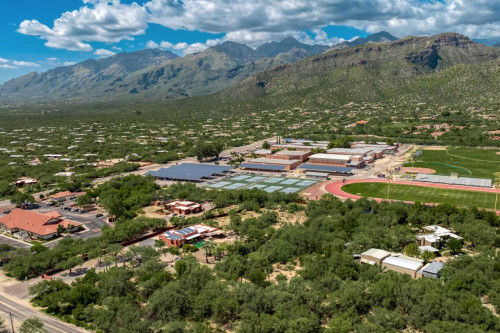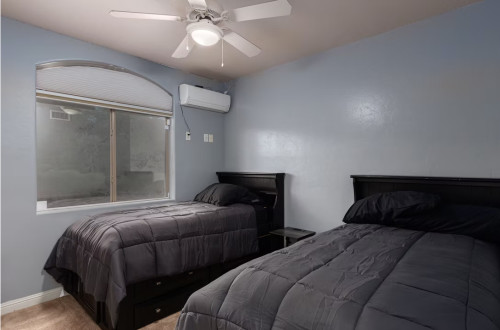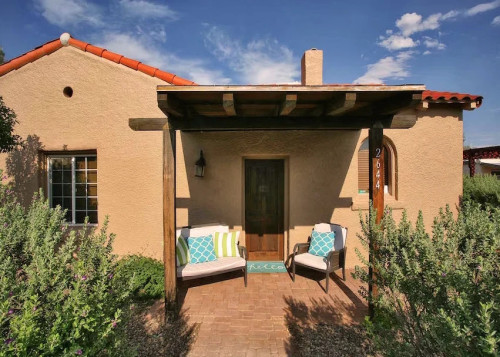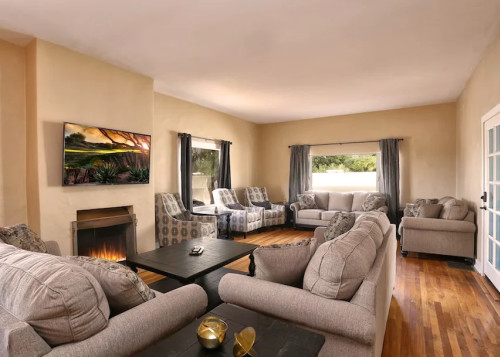






Pivot Transitional Living
Treatment Focus
This center treats primary substance use disorders and co-occurring mental health conditions. Your treatment plan addresses each condition at once with personalized, compassionate care for comprehensive healing.
Primary Level of Care
Transitional housing designed to support individuals recovering from substance use disorders offering a safe, supportive and structured environment for practicing long-term sobriety, while reintegrating back into daily living.
This provider hasn't verified their profile's information. Are you the owner of this center? Claim your listing to better manage your presence on Recovery.com.
Treatment Focus
This center treats primary substance use disorders and co-occurring mental health conditions. Your treatment plan addresses each condition at once with personalized, compassionate care for comprehensive healing.
Primary Level of Care
Transitional housing designed to support individuals recovering from substance use disorders offering a safe, supportive and structured environment for practicing long-term sobriety, while reintegrating back into daily living.
Private Pay
You pay directly for treatment out of pocket. This approach can offer enhanced privacy and flexibility, without involving insurance. Exact costs vary based on program and length of stay. Contact the center for specific details.
Pivot Transitional Living
Pivot Transitional Living
About Pivot Transitional Living
Pivot Recovery Living is a structured sober living program for young men in Tucson, Arizona. Designed specifically for adolescents, young adults, and college-age residents, Pivot offers a phased approach that helps each individual grow in independence while staying grounded in recovery. Residents live on age-specific campuses, starting in a highly supportive environment and moving toward more freedom as they develop the skills and confidence to live on their own.
Immersive Recovery
The program blends clinical care and peer support, combining regular therapy sessions with mentorship from staff members who are also in recovery. From day one, residents are immersed in 12-Step work, attending meetings, getting sponsors, and becoming active in the broader recovery community. Life at Pivot also includes help with school, work, and life skills. Residents can re-enroll in high school or college, prepare for jobs, and learn practical things like budgeting, time management, and healthy habits.
Collegiate Recovery Program
For those pursuing higher education, Pivot offers a dedicated Collegiate Recovery Program. Residents in this track live just minutes from the University of Arizona and Pima Community College and receive structured academic support alongside their recovery work. The program includes weekly advising, tutoring, and study halls to help students stay on track academically while staying connected to their recovery. With built-in accountability, gym memberships, and a strong peer community, the college program is designed to help students thrive both in the classroom and in sobriety.
Campuses Designed for Growth
Pivot operates 3 thoughtfully designed campuses in central Tucson, each tailored to the needs of a specific age group. The Adolescent Transitional Campus spans three peaceful acres beneath the Santa Catalina Mountains, offering structure and support for teens. The Transitional Living Campus is a private, courtyard-style complex where young men begin taking college classes, working, or volunteering. College-aged residents live at the Collegiate Recovery Campus, an expansive estate built by architect Josias Joesler—featuring a chef’s kitchen, entertainment spaces, and quiet study areas ideal for academic success in sobriety.
Recovery in the Heart of the Southwest
Tucson’s warm, sunny setting plays a big role in the recovery process. With easy access to outdoor adventures and a thriving recovery community, residents have the space and support to rebuild their lives. Pivot is a great option for young men who are ready to commit to recovery in a place that feels structured, empowering, and connected.
Center Overview
Treatment Focus
This center treats primary substance use disorders and co-occurring mental health conditions. Your treatment plan addresses each condition at once with personalized, compassionate care for comprehensive healing.

Pricing and Program Length
Estimated Center Costs
Center pricing can vary based on program and length of stay. Contact the center for more information. Recovery.com strives for price transparency so you can make an informed decision.
Levels of Care






Treatment
Specializations
Alcohol
Using alcohol as a coping mechanism, or drinking excessively throughout the week, signals an alcohol use disorder.
Drug Addiction
Drug addiction is the excessive and repetitive use of substances, despite harmful consequences to a person's life, health, and relationships.
Young Adults
Emerging adults ages 18-25 receive treatment catered to the unique challenges of early adulthood, like college, risky behaviors, and vocational struggles.
Sober Living
These structured living environments help people transition out of rehab. Residents have more freedom than they do during rehab, but still follow certain rules.
Who We Treat
Approaches
Experiential
Expressive tools and therapies help patients process past situations, learn more about themselves, and find healing through action.
Individual Treatment
Individual care meets the needs of each patient, using personalized treatment to provide them the most relevant care and greatest chance of success.
Twelve Step
Incorporating spirituality, community, and responsibility, 12-Step philosophies prioritize the guidance of a Higher Power and a continuation of 12-Step practices.
Therapies
1-on-1 Counseling
Patient and therapist meet 1-on-1 to work through difficult emotions and behavioral challenges in a personal, private setting.
Adventure Therapy
This experiential approach uses the physical and emotional challenges of outdoor activities as tools for personal growth.
Life Skills
Teaching life skills like cooking, cleaning, clear communication, and even basic math provides a strong foundation for continued recovery.
Recreation Therapy
In recreation therapy, recovery can be joyful. Patients practice social skills and work through emotional triggers by engaging in fun activities.
Twelve Step Facilitation
12-Step groups offer a framework for addiction recovery. Members commit to a higher power, recognize their issues, and support each other in the healing process.
Conditions We Treat
Anxiety
Anxiety is a common mental health condition that can include excessive worry, panic attacks, physical tension, and increased blood pressure.
Depression
Symptoms of depression may include fatigue, a sense of numbness, and loss of interest in activities. This condition can range from mild to severe.
Post Traumatic Stress Disorder
PTSD is a long-term mental health issue caused by a disturbing event or events. Symptoms include anxiety, dissociation, flashbacks, and intrusive thoughts.
Trauma
Some traumatic events are so disturbing that they cause long-term mental health problems. Those ongoing issues can also be referred to as "trauma."
Substances We Treat
Alcohol
Using alcohol as a coping mechanism, or drinking excessively throughout the week, signals an alcohol use disorder.
Co-Occurring Disorders
A person with multiple mental health diagnoses, such as addiction and depression, has co-occurring disorders also called dual diagnosis.
Drug Addiction
Drug addiction is the excessive and repetitive use of substances, despite harmful consequences to a person's life, health, and relationships.
Languages
Experience
Personal Amenities
Activities

We love hearing about your treatment experience
Help individuals and families seeking treatment by sharing your first-hand experience with this treatment provider. Review Guidelines.





